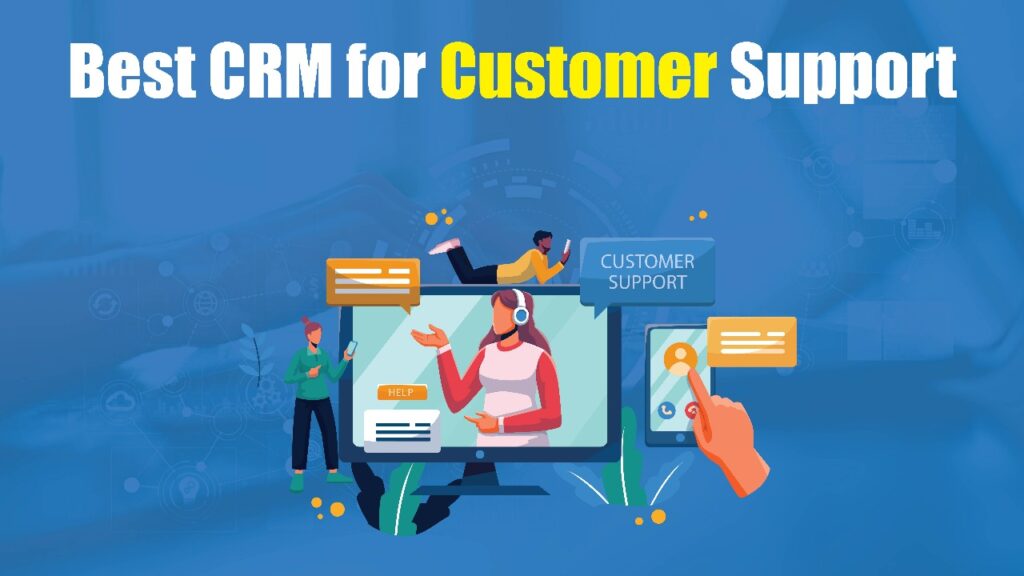Are you looking to enhance your performance in customer support?
Choosing the Best CRM for Customer Support can completely transform how your business handles customer queries, resolves issues, and builds long-term relationships.
In this article, we are going to discuss how customer support CRMs work, their different types, and the key features of each that make them valuable. You’ll also learn about benefits from using a dedicated CRM, choosing the best option for your needs, and integrating smoothly with existing tools. Even better, we have some tips on using data and analytics to improve your support strategy.
Let’s begin.
What is Customer Support Software?
Customer support software is designed to help businesses track, manage, and respond to customer support requests clearly and efficiently. Instead of a simple shared inbox, this software provides a ticketing system that moves all the customer messages from email, live chat, social media, messaging apps, and phone calls into one place.
With customer support software, agents can utilize prepared replies, collaborate in the same ticket, and tag or categorize issues so they are easy to review later. Many platforms also have self-service features like FAQs and knowledge bases to help customers find the answers themselves without waiting for an agent.
Modern customer support tools also provide analytics, reporting, and AI features that help teams automate routine tasks, understand customer trends, and make data-driven improvements to deliver faster and better support.
What is the Role of CRM in Customer Support?
Customer expectations are higher than ever, and that’s where a CRM becomes essential. It acts as the backbone of modern customer support by keeping everything organized and making every interaction smoother.
A CRM helps you track every conversation with a customer—whether it comes from email, chat, phone, or social media. This means no message gets missed, and your team can instantly see the customer’s history, past issues, preferences, and purchases. Having this information ready helps support agents give faster and more personalized help.
But CRM systems do more than store data. They also improve workflows by automating tasks like ticket assignments, follow-up reminders, and customer notifications. This saves time, reduces errors, and keeps your whole team aligned.
In short, the role of CRM in customer support is to simplify your work while improving the customer experience. When used properly, it helps you deliver faster responses, solve problems more efficiently, and build strong, long-lasting customer relationships.
What Are the Benefits of Using CRM for Customer Support?
Using a CRM for customer support can completely change the way you handle customer interactions. Here are eight major benefits that make it a powerful tool:
Streamlines Customer Interactions
A CRM brings all customer information into one system, giving you a complete view of every past interaction. You can quickly check previous issues, conversations, and preferences, which helps you respond faster and more accurately. When everything is organized, both your team and your customers save time.
Improves Response Times
With automated ticketing, alerts, and task routing, a CRM ensures no customer query gets missed. It sends issues to the right team members and tracks progress automatically. This reduces waiting time and shows customers that their concerns matter.
Enhances Personalization
CRM tools allow you to personalize responses based on customer history and behavior. Simple touches—like using their name or recalling a past purchase—make customers feel valued. This builds trust and creates stronger relationships.
Enables Proactive Support
With CRM insights and analytics, you can spot potential issues early. For example, if a product update might affect certain users, you can reach out beforehand. This proactive approach boosts customer confidence and reduces future problems.
Offers Real-Time Insights
CRMs generate helpful reports on response times, ticket volume, customer satisfaction, and more. These insights guide you in improving your support strategy and maintaining high-quality service.
Improves Team Collaboration
Because all customer data is stored in one place, your team can easily share information. Even if a customer switches from chat to email or phone, any agent can pick up where the conversation left off. This eliminates confusion and keeps support consistent.
Builds Customer Loyalty
Fast responses, clear communication, and personalized service make customers feel appreciated. Over time, this leads to higher satisfaction and loyalty. Happy customers stay longer and often recommend your brand to others.
Supports Business Growth
As your business expands, a CRM grows with you. It can handle increasing numbers of customer queries without slowing down. CRMs also integrate with other tools, ensuring smooth workflows as your team and customer base grow.
Key Features of CRM for Customer Support
Customer support is all about delivering fast, personalized, and reliable help. A CRM system makes this easier by organizing information, improving workflows, and helping your team provide better service. Below are the key features that make CRM an essential tool for customer support.
Centralized Customer Information
A CRM stores all customer details—contact info, past conversations, purchase history, and preferences—in one place. This makes it easy for your team to understand each customer’s background and offer personalized support. No need to switch between multiple tools; everything is available in seconds.
Automated Ticketing System
CRMs automatically create and assign tickets whenever a customer reports an issue. The system routes each ticket to the right support agent and tracks its progress. This ensures no request is forgotten and every issue is handled quickly and efficiently.
Complete Interaction History
Every call, email, chat, or message is logged inside the CRM. Having a full history helps your team understand previous issues and provide accurate solutions. When customers contact you again, agents can instantly pick up where the last conversation ended.
Self-Service Portal
Many CRM platforms include a self-service portal where customers can find FAQs, tutorials, and step-by-step guides. They can also submit requests or check their ticket status. This reduces support workload and gives customers 24/7 access to solutions.
Real-Time Analytics and Reporting
CRMs provide powerful reporting tools that show metrics like response times, resolution rates, and customer satisfaction scores. These insights help you identify what’s working, what needs improvement, and how to optimize your support processes for better results.
Automated Follow-Ups
Following up with customers shows that you care about their experience. A CRM can automate this by sending follow-up emails or reminders after a ticket is resolved. This helps maintain strong relationships and increases customer satisfaction.
Top 10 CRM Tools for Customer Support in 2026
Following are the top 10 CRM tools for customer support in 2026:
- Zendesk
- Freshdesk
- Salesforce Service Cloud
- HubSpot Service Hub
- Zoho Desk
- Help Scout
- ServiceNow
- Richpanel
- LiveAgent
- Front
1. Zendesk
Best for: AI-powered customer experience
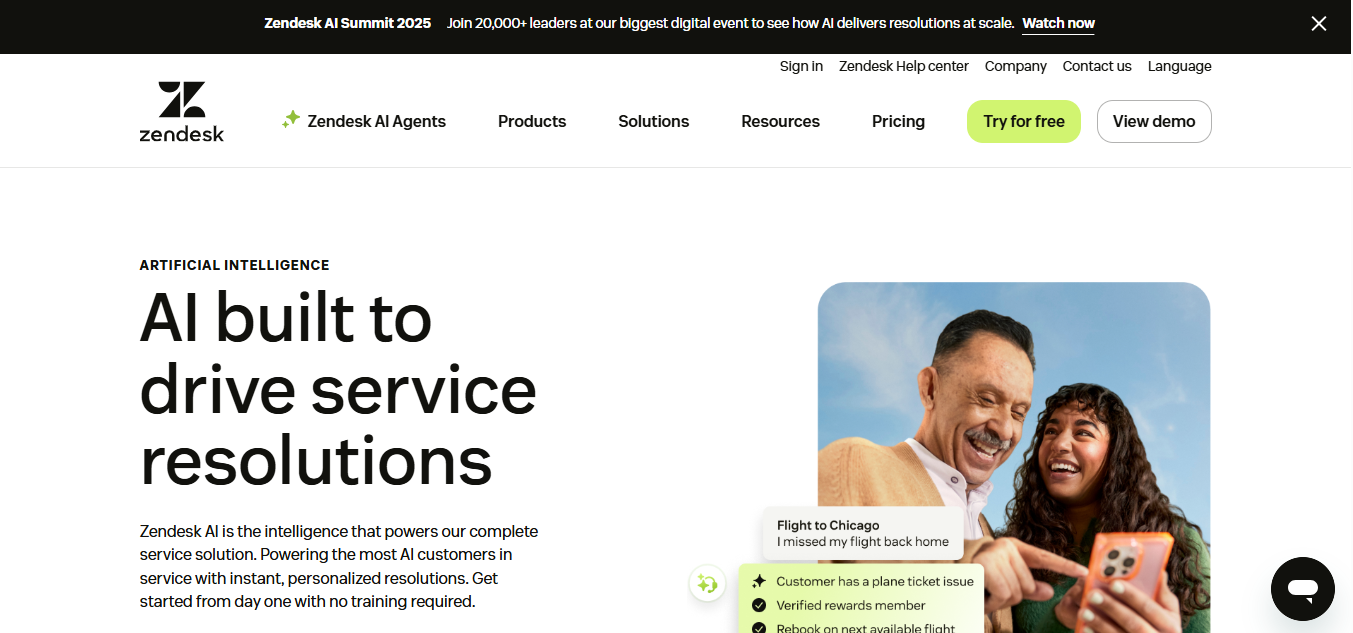
Overview
Zendesk is one of the most trusted CRM platforms for customer support, known for its powerful AI tools and smooth omnichannel experience. It allows support agents to manage all customer conversations—email, chat, social media, or phone—from a single workspace. This eliminates the need to switch between multiple dashboards and helps teams respond faster with complete visibility into each customer’s history and past issues.
With over 1,700 plug-and-play integrations, Zendesk makes it easy to build a full 360-degree customer view, collaborate with internal teams, and automate daily tasks. The platform’s built-in AI is trained on billions of real support interactions, enabling smart ticket routing, intent detection, sentiment analysis, and automated issue resolution. Combined with strong analytics and enterprise-grade security, Zendesk offers a reliable, scalable solution for businesses of all sizes.
Key Features
- AI-powered ticket routing based on intent, priority, and sentiment
- Unified agent workspace for all support channels
- AI agents that autonomously solve customer issues
- Advanced reporting and analytics for performance insights
- 1,700+ integrations to build a complete customer profile
- Enterprise-level security and compliance tools
Pros
- Strong, industry-leading AI support tools
- Easy-to-use interface and quick setup
- Excellent omnichannel ticketing system
- Deep integrations and customization options
- Powerful reporting and knowledge management tools
Cons
- AI features require paid add-ons
- No free plan available
- Can be expensive for small teams
Pricing
- Support Team: $19/agent/month (billed annually) – Streamlined email support to get your team up and running fast
- Suite Team (AI Included): $55/agent/month (billed annually) – Automate service with AI and support across all channels
- Suite Professional (AI Included): $115/agent/month (billed annually) – Optimize operations with AI, data, and customizations
2. Freshdesk
Best for: Teams with IT needs
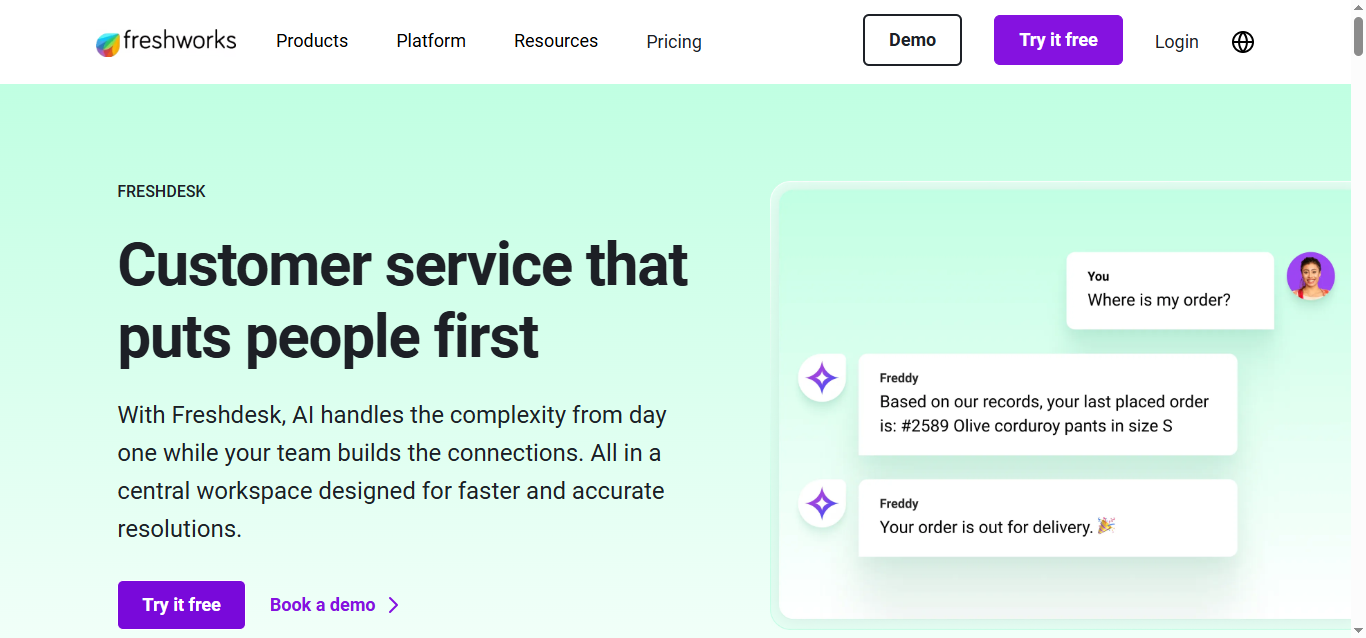
Overview
Freshdesk is a popular customer support platform designed to help teams manage requests efficiently across multiple channels. With an intuitive interface and powerful automation, it enables agents to deliver fast, organized, and consistent support. The platform supports email, chat, phone, and social media interactions, ensuring all customer communications are managed from a single workspace.
Freshdesk also includes self-service options such as knowledge bases and community forums, allowing customers to find answers without contacting an agent. Automation features help teams reduce repetitive tasks, and omnichannel support ensures a seamless experience. With its scalable plans and free option for unlimited agents, Freshdesk is ideal for both small businesses and larger teams looking to optimize customer support operations.
Key Features
- Omnichannel support across email, chat, phone, and social media
- Automated ticketing and workflow management
- Customer self-service portal and community forums
- AI-powered suggestions for agents and ticket resolution
- Advanced reporting and analytics tools
- Free plan available for unlimited agents
Pros
- User-friendly and intuitive interface
- Strong automation and workflow capabilities
- Free plan for small teams
- Omnichannel support keeps everything in one place
- Scalable plans suitable for growing businesses
Cons
- Some advanced features require paid plans
- Certain AI features may need setup by developers
- Basic plan has limited functionality
Pricing
- Growth: $15/agent/month (billed annually) – includes ticketing, customer portal, and reports
- Pro: $49/agent/month (billed annually) – adds custom portals, advanced ticketing, reporting, and routing
- Enterprise: $79/agent/month (billed annually) – includes audit logs, approval workflows, skills-based assignments, and enhanced security
3. Salesforce Service Cloud
Best for: Sales teams and large enterprises
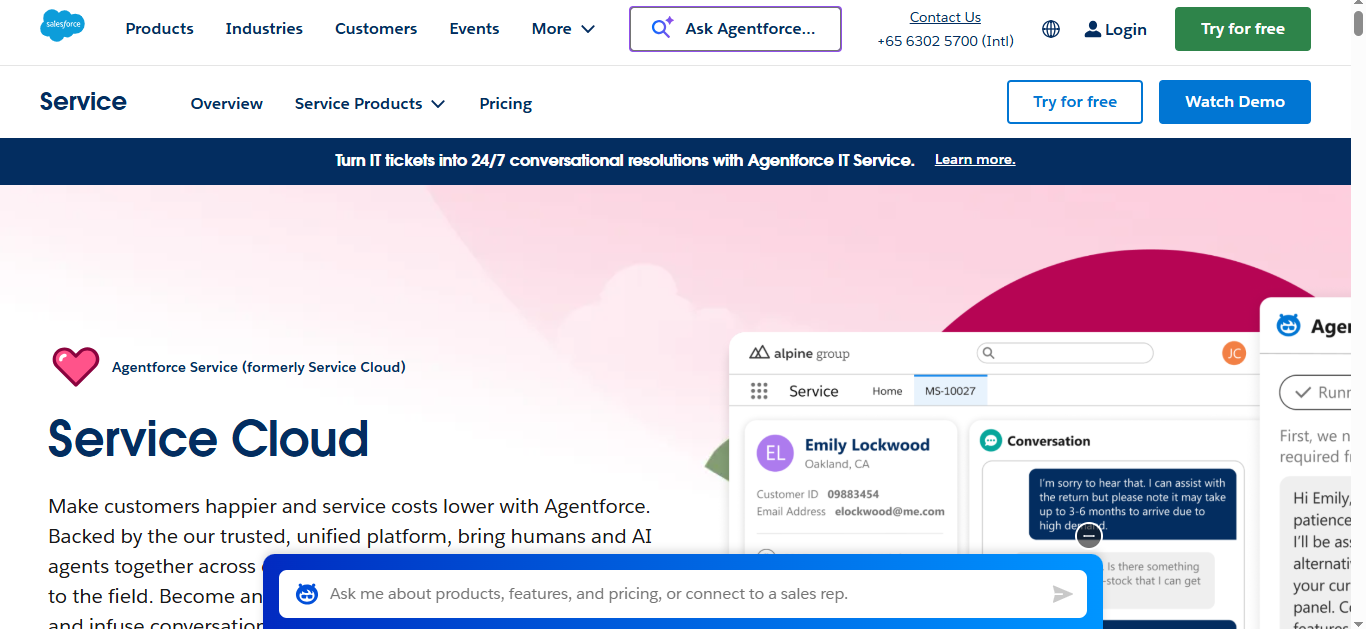
Overview
Salesforce Service Cloud is a leading customer support platform that offers an omnichannel workspace for managing customer interactions. Agents can access full ticket context, including customer contact details, past interactions, and purchase history. Features like Swarming let teams collaborate on complex cases by adding skilled agents to dedicated Slack channels, ensuring faster and more efficient problem resolution.
The platform also allows workflow customization and automated ticket routing to the right agent. With advanced reporting, pre-built dashboards, and analytics, managers can monitor team performance across all support channels. Service Cloud integrates seamlessly with other Salesforce tools, helping sales and service teams work together to enhance customer experience and support the sales pipeline. While powerful, the platform can be complex and may take time to learn, making it best suited for businesses already using Salesforce or large enterprises looking for a scalable solution.
Key Features
- Omnichannel support across email, chat, phone, and social media
- Customizable workflows and automated ticket routing
- Swarming feature for team collaboration on complex cases
- Advanced reporting and analytics with pre-built dashboards
- Knowledge base and AI-powered self-service (Einstein Bot)
- Seamless integration with Salesforce ecosystem
Pros
- Highly scalable and suitable for large enterprises
- Strong customization for dashboards and workflows
- Omnichannel support in one unified workspace
- Advanced analytics and reporting tools
- Integrates well with other Salesforce products
Cons
- AI features only available in higher-tier plans
- No ticket routing in the basic plan
- Platform can be complex and has a learning curve
Pricing
- Starter Suite: $25/user/month – Simple CRM suite with marketing, sales, service, and commerce tools (transaction fees apply)
- Pro Suite: $100/user/month – Adds more advanced tools for marketing, sales, service, and commerce (billed annually, contract required)
- Enterprise: $175/user/month – Full-featured CRM with built-in AI (billed annually)
4. HubSpot Service Hub
Best for: Marketing teams
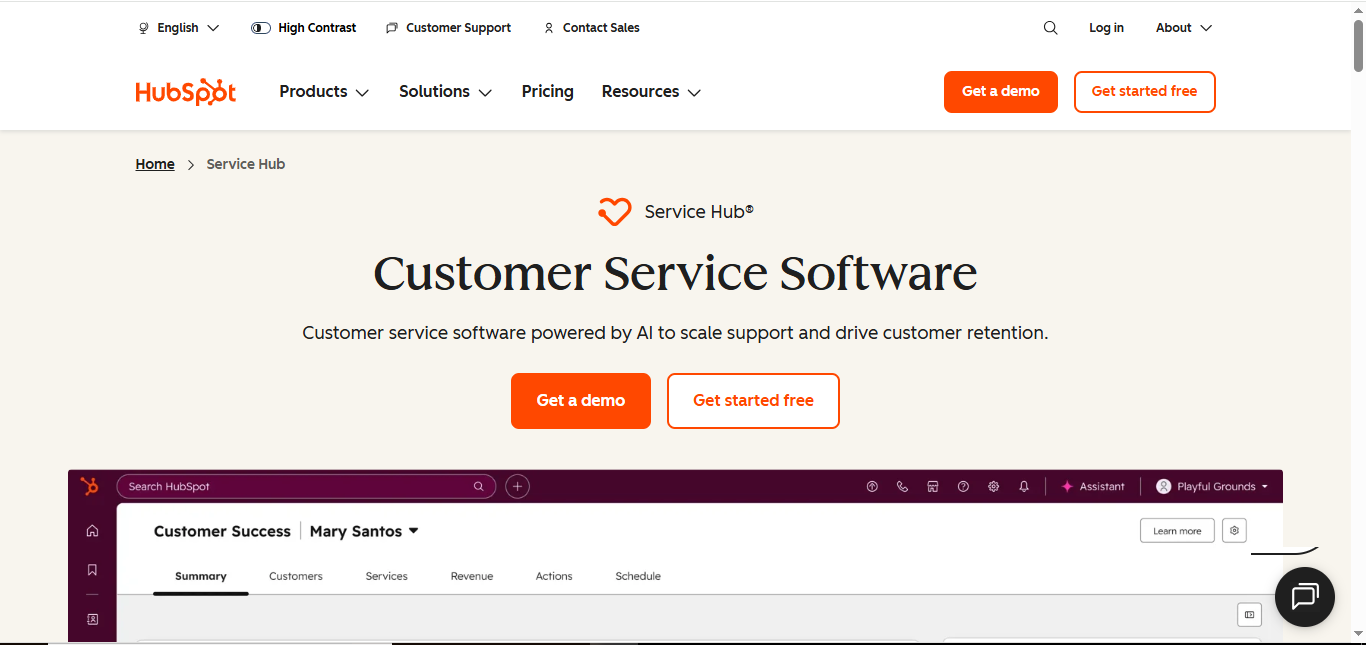
Overview
HubSpot Service Hub is a customer support platform designed to help marketing and support teams work efficiently. It features a shared inbox where agents can see full customer history, ticket information, and queue details. Integration with HubSpot’s CRM ensures that information is synced across sales, marketing, and support tools, making collaboration seamless. Agents can even manage tickets on the go with a mobile inbox, keeping them connected while away from their desks.
The platform also provides customer portals and customizable feedback surveys. Customers can view, open, and reply to their tickets, as well as access the company knowledge base. Automated follow-ups based on survey responses help gather insights, while reporting and analytics dashboards track performance metrics like response time, support volume, and agent productivity. Dashboards can host up to 30 reports, giving teams full visibility into their support operations.
Key Features
- Shared inbox with complete customer history
- Integration with HubSpot CRM and other HubSpot tools
- Customer portals for ticket tracking and knowledge base access
- Automated follow-up responses based on surveys
- Customizable dashboards with up to 30 reports
- Mobile inbox for agents on the go
Pros
- Full integration with HubSpot sales and marketing tools
- Easy-to-use customer portals
- Customizable reporting dashboards
- Automation features for follow-ups and surveys
- Scalable for growing teams
Cons
- Routing and IVR only available in higher-tier plans
- Lower-tier plans lack knowledge base functionality
- Can be expensive for smaller teams
Pricing
- Professional: Starts at $800/month – Includes 3 Core Seats; additional seats $45/month
- Enterprise: Starts at $3,600/month – Includes 5 Core Seats; additional seats $75/month
5. Zoho Desk
Best for: Zoho ecosystem users and cost-conscious businesses
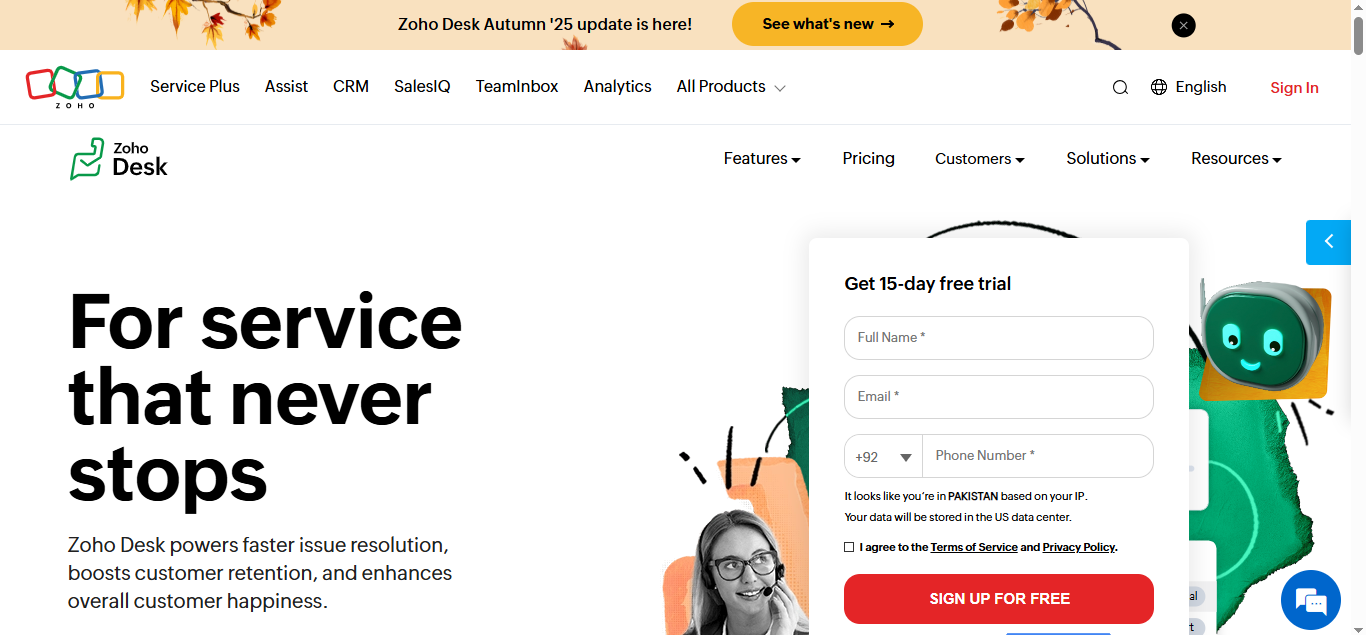
Overview
Zoho Desk is a customer support platform designed to help businesses manage tickets efficiently while leveraging automation and AI. It provides a unified dashboard where agents can handle customer issues from multiple channels in one place. Tickets can be organized by status, priority, or due date, helping teams stay on top of customer requests and respond promptly.
The platform also includes self-service options, service-level agreements (SLAs), an advanced response editor, and built-in analytics for tracking performance. Zoho Desk integrates seamlessly with other Zoho tools, creating a connected ecosystem. Its AI assistant, Zia, detects customer sentiment, auto-tags tickets, routes them intelligently, and alerts agents to unusual activity—making support faster, smarter, and more proactive.
Key Features
- AI assistant (Zia) for sentiment analysis and smart ticket routing
- Omnichannel support through a single dashboard
- Ticket management system with status, priority, and due date tracking
- Built-in analytics and customizable dashboards
- Self-service options and knowledge base
- Integration with other Zoho tools for a unified ecosystem
Pros
- AI-powered assistant for intelligent ticket handling
- Customizable dashboards for performance tracking
- Omnichannel support in one platform
- Self-service and knowledge base features
- Affordable pricing for small to medium businesses
Cons
- Knowledge base not included in the basic plan
- Multilingual support only available in higher-tier plans
- Chat feature requires the most expensive plan
Pricing
- Express: $7/user/month (billed annually)
- Standard: $14/user/month (billed annually)
- Professional: $23/user/month (billed annually)
- Enterprise: $40/user/month (billed annually)
6. Help Scout
Best for: Collision detection and small to mid-sized teams
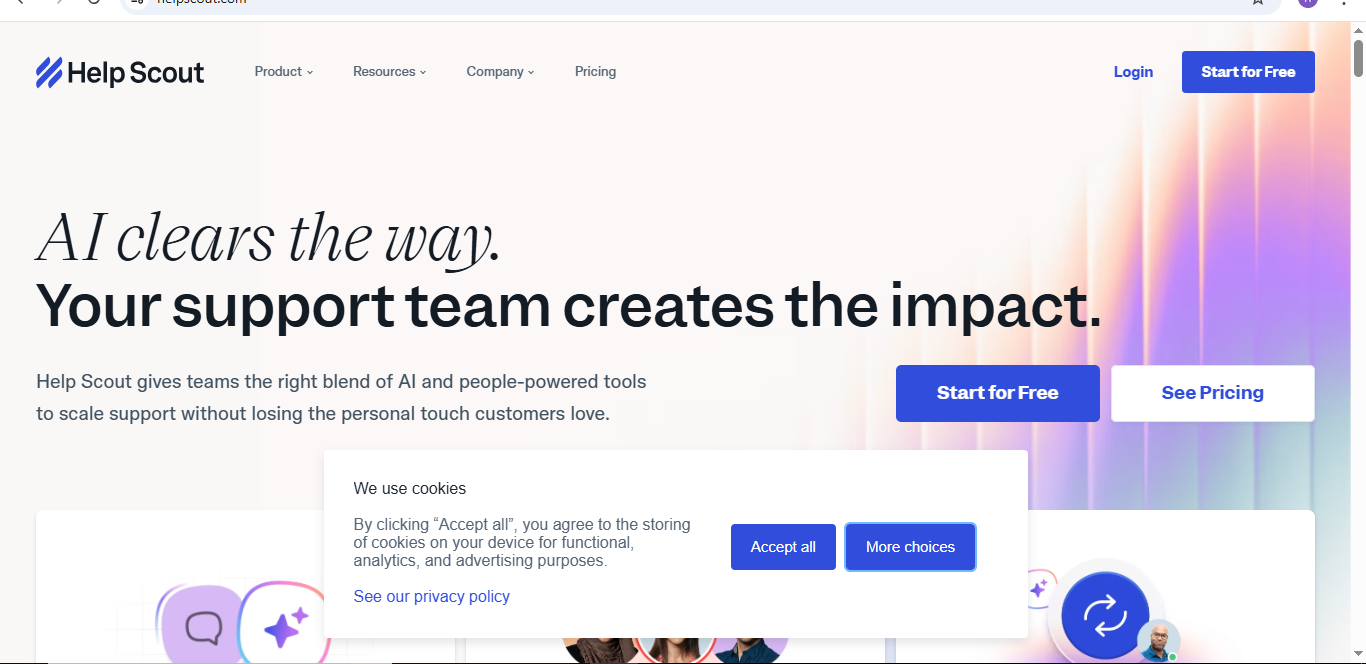
Overview
Help Scout is a customer support platform that centralizes all customer data, interactions, and history into a shared inbox. This gives agents the context they need for each request and prevents duplicated work through collision detection, ensuring two agents don’t handle the same ticket simultaneously. Internal notes also allow teams to collaborate efficiently without leaving the inbox.
The platform includes AI tools such as AI Summarize, which condenses long email threads into bullet points, and AI Assist, which helps agents draft replies, improve tone, and even translate messages. Help Scout also offers customer surveys for feedback and a directory of over 100 integrations for CRM, support, marketing, e-commerce, and analytics, making it a versatile tool for growing teams.
Key Features
- Shared inbox with collision detection and private internal notes
- AI Summarize to condense long email threads
- AI Assist for drafting, improving, and translating replies
- Customer satisfaction surveys and feedback collection
- Knowledge base and self-service resources
- Integration directory with 100+ apps for support, marketing, and CRM
Pros
- AI-powered tools for faster and better responses
- Internal collaboration through private notes and shared inbox
- Customer surveys to track satisfaction
- Knowledge base and self-service support
- Simple and user-friendly interface
Cons
- Limited integrations in lower-tier plans
- Advanced workflows only available in higher-tier plans
- AI add-on incurs extra cost per resolution
Pricing
- Standard: $25/user/month – Ideal for growing teams automating basic tasks
- Plus: $45/user/month – For teams managing higher volume and multiple channels
- Pro: $75/user/month – For teams needing full-scale support and advanced security
- AI Answers Add-on: $0.75 per resolution – Automates up to 70% of routine requests
7. ServiceNow
Best for: Teams with IT needs and enterprises
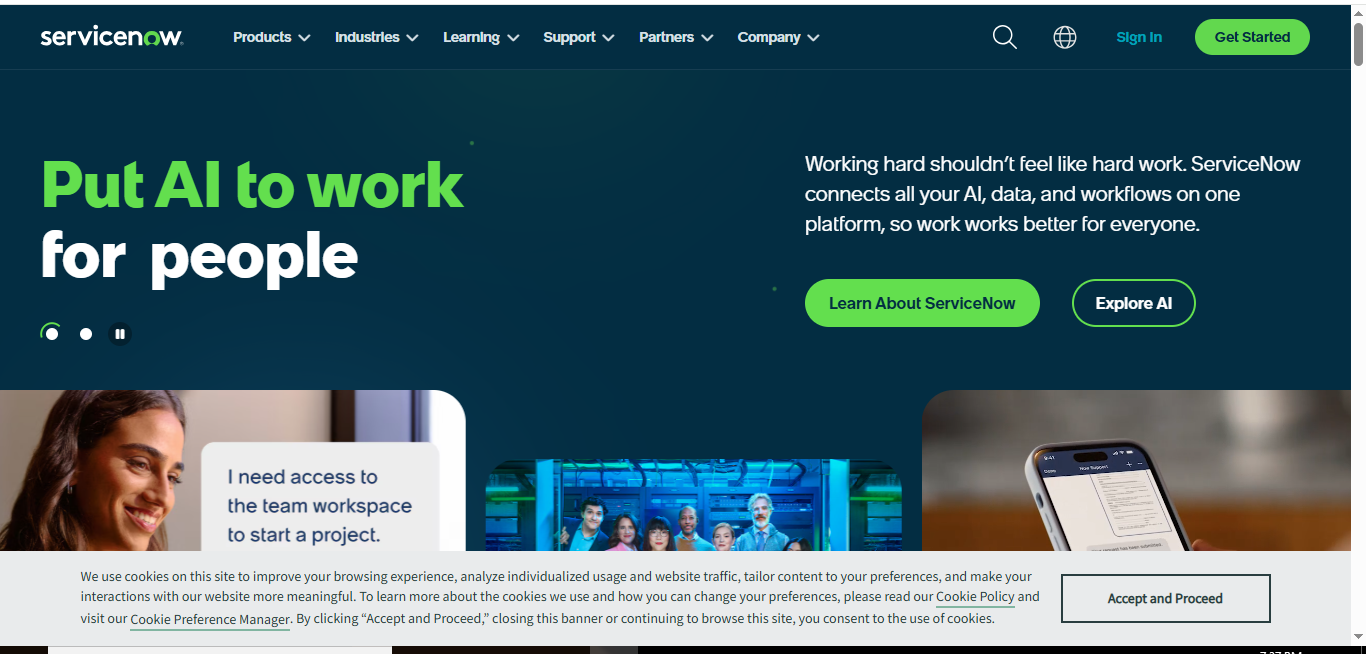
Overview
ServiceNow is a cloud-based customer service platform designed for enterprise-level teams and IT departments. It offers a self-service portal where customers can submit service requests, access help center articles, and join community forums to ask questions or share experiences—all without needing direct support from an agent. This reduces workload for support teams and allows customers to resolve simple issues independently.
The platform also provides advanced workflow automation to help agents and IT teams handle repetitive tasks efficiently. Users can create processes to log, resolve, and close incidents while maintaining accurate records. ServiceNow’s Customer Service Management (CSM) tools are enhanced with generative AI, including the Now Assist tool, which offers AI-powered response suggestions and guidance for next steps in ticket resolution. Cross-enterprise workflows give teams end-to-end visibility across departments, making it ideal for large organizations with complex support needs.
Key Features
- Customer self-service portal for submitting requests and accessing help articles
- Community forums for customer engagement
- Workflow automation to streamline repetitive tasks
- Cross-enterprise workflows for full visibility across departments
- AI-powered assistance (Now Assist) for ticket resolution
- Built-in reporting and analytics for performance insights
Pros
- Generative AI capabilities for faster ticket handling
- Automated workflows save time and reduce errors
- Cross-enterprise workflows provide full operational visibility
- Scalable for large teams and complex IT environments
- Customizable platform to fit enterprise needs
Cons
- Limited features in the basic plan
- Some capabilities require developer setup and maintenance
- Platform can be complex and may have a learning curve
Pricing
ServiceNow uses custom pricing based on your company’s specific needs. Custom quotes include:
- Detailed evaluation of your business requirements
- Scalable packages suitable for all stages of growth
- Flexible pricing tailored to your organization
8. Richpanel
Best for: Businesses looking to leverage AI in customer service

Overview
Richpanel is a customer service platform powered by OpenAI’s GPT model, designed to help businesses automate repetitive tasks and scale support without hiring additional agents. The AI assists agents by drafting accurate replies, automating data entry, and learning from past interactions, giving teams full transparency and control over AI-generated responses. By pointing the AI to your website FAQs, it can start assisting immediately and continuously improve over time.
Richpanel also provides multichannel support, enabling agents to manage email, SMS, live chat, phone, and social media from a single inbox. A robust self-service portal lets customers resolve common issues instantly, reducing ticket volumes while boosting satisfaction. The platform includes built-in live chat, customer surveys, data integration, automation workflows, and comprehensive reporting, making it a complete AI-powered solution for modern customer service teams.
Key Features
- AI-powered assistance for drafting replies and automating tasks
- Multichannel support (email, SMS, live chat, phone, social media)
- Self-service portal to reduce ticket volume and improve customer satisfaction
- Built-in live chat supporting 15+ languages
- Customer data integration to provide agents with full context
- Automation workflows and reporting dashboards for efficiency and insights
Pros
- Powerful AI that learns from past interactions
- Centralized multichannel inbox for agents
- Self-service portal reduces workload and improves satisfaction
- Customer surveys to track feedback and online reputation
- Automation features streamline repetitive tasks and routing
Cons
- Enterprise plan pricing is custom and may be expensive for large teams
- Learning curve for AI setup and advanced features
- Some features may require technical knowledge for full implementation
Pricing
- Pro: $69/agent/month ($828/year) – Includes AI and automation at no extra cost
- Pro Max: $99/agent/month ($1,188/year) – Advanced analytics, multiple brands, and more channels
- Enterprise: Custom – For teams with more than 50 agents, includes custom integrations and white-glove setup
9. LiveAgent
Best for: Live chat and proactive customer engagement
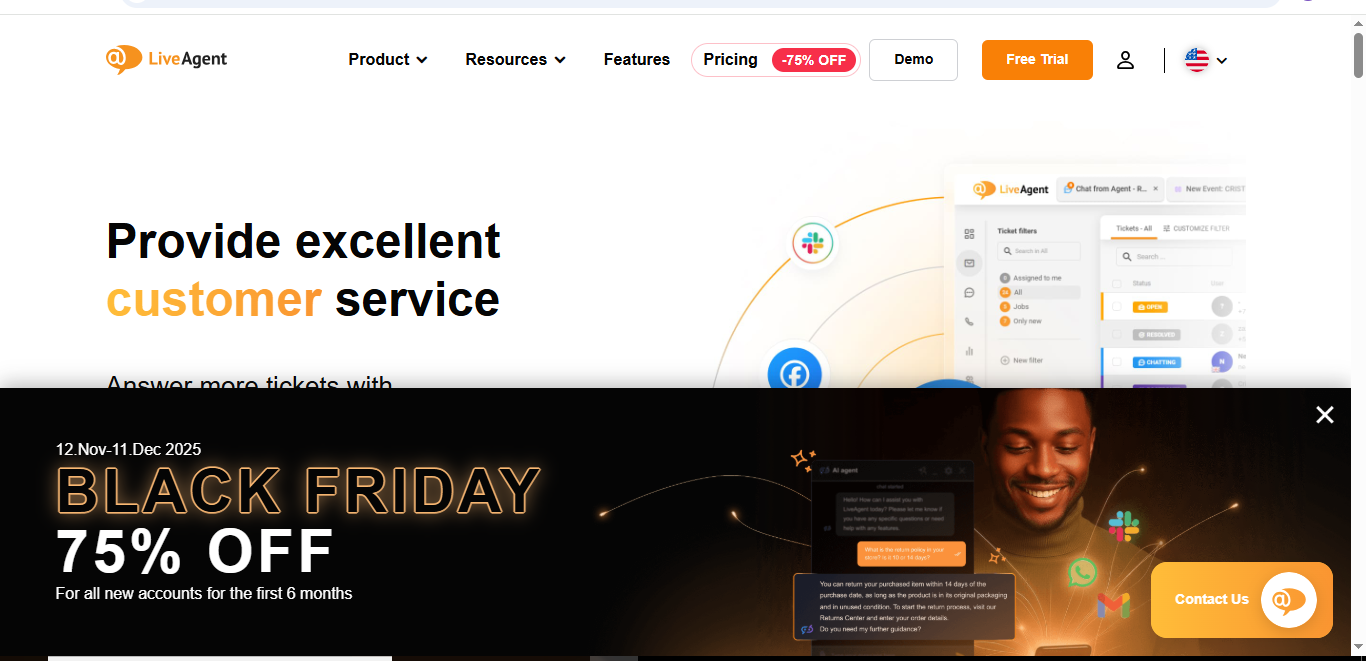
Overview
LiveAgent is a customer service platform designed to provide excellent live chat experiences. It features a real-time typing view, website monitoring for chat engagement, and proactive chat invitations based on agent availability. The universal inbox collects customer requests from multiple channels and routes them to the right agents, ensuring faster and more organized responses.
Beyond live chat, LiveAgent offers a full help desk solution including a ticketing system, knowledge base, call center software with inbound and outbound capabilities, IVR, and reporting and analytics tools. Customers can request callbacks instead of waiting on hold, while businesses can automate workflows with Rules to route, tag, and resolve tickets. The platform also supports numerous integrations with third-party tools, making it highly customizable for growing support teams.
Key Features
- Proactive live chat with real-time typing view
- Universal inbox for multi-channel ticket management
- Built-in call center with IVR and callback options
- Knowledge base for self-service support
- Workflow automation using Rules for routing and ticket handling
- Reporting and analytics dashboards
Pros
- Knowledge base for self-service
- IVR routing for better call management
- Proactive live chat to engage customers
- Multi-channel support in one inbox
- Highly customizable with integrations
Cons
- SLAs not available in the basic plan
- Advanced security only in higher-tier plans
- Some advanced features may require setup knowledge
Pricing
- Small Business: $15/agent/month for first 6 months
- Medium Business: $29/agent/month for first 6 months
- Large Business: $49/agent/month for first 6 months
- Enterprise: $69/agent/month for first 6 months
10. Front
Best for: Shared inbox management and team collaboration

Overview
Front is a customer service platform focused on shared inbox management, helping teams consolidate customer inquiries from multiple channels into one place. Automated workflows route messages to the best-suited agent, ensuring faster responses. Each customer interaction is logged, so agents can access complete customer history to provide informed and personalized support.
The platform also includes collaboration tools for internal communication on tickets and unified reporting for monitoring team performance and customer satisfaction. Businesses can build a help center for self-service, with permissions to manage content creation and integration with live chat, allowing customers to easily switch between self-service and direct support.
Key Features
- Shared inbox consolidating messages from multiple channels
- Automated workflows for routing and ticket management
- Customer interaction logging for full history access
- Built-in collaboration features for teams
- Knowledge base for self-service support
- Unified reporting and analytics
Pros
- Centralized shared inbox improves efficiency
- Knowledge base for self-service support
- Omnichannel ticketing in one platform
- Collaboration tools enhance team communication
- Reporting dashboards for performance insights
Cons
- Chatbots not available in the basic plan
- Limited routing capabilities outside higher-tier plans
- Some advanced features require higher-tier subscriptions
Pricing
- Starter: $25/seat/month – Essential capabilities for single-channel support, up to 10 seats
- Professional: $65/seat/month – Enhanced automation and reporting for omnichannel support, up to 50 seats
- Enterprise: $105/seat/month – Advanced AI tools to accelerate resolution and elevate customer experience
The Future of Customer Support
Customer support is evolving faster than ever, driven by rising expectations and new technologies. In the future, businesses will rely more on AI, chatbots, and virtual assistants to handle routine queries, provide instant answers, and assist agents in resolving complex issues efficiently.
Personalization and data-driven support will become standard. Companies will use insights from customer behavior and preferences to offer tailored solutions, anticipate problems, and deliver proactive assistance. Omnichannel support—seamlessly connecting phone, email, chat, social media, and self-service—will ensure customers get consistent, high-quality service wherever they interact.
Staying ahead with innovative customer support technologies will not only improve customer satisfaction but also give businesses a competitive edge, foster loyalty, and create opportunities for growth. The future of support is smarter, faster, and more connected than ever before.
Summary
Customer support software is essential for businesses that want to provide fast, efficient, and personalized assistance to their customers. Choosing the right tool can help teams manage inquiries across multiple channels, track customer interactions, and resolve issues more effectively.
With features like automation, analytics, and self-service portals, modern customer support solutions not only save time but also improve customer satisfaction and loyalty. Staying up-to-date with these technologies allows businesses to stay ahead of the competition while delivering exceptional support experiences. Investing in the right customer support software is a key step toward building stronger customer relationships and driving long-term business growth.
Frequently Asked Questions (FAQs)
What is customer support software?
Customer support software is a tool that helps businesses manage and respond to customer inquiries efficiently. It consolidates messages from multiple channels like email, chat, phone, and social media into one system, often including ticketing, automation, and reporting features.
Why is customer support software important?
It improves response times, ensures no request is missed, and allows teams to provide personalized support. Using such software can boost customer satisfaction, loyalty, and overall business growth.
Can small businesses benefit from customer support software?
Yes! Even small teams can improve efficiency and provide professional support by using software with automation, centralized data, and self-service options. Many platforms offer free or affordable plans suitable for small businesses.
How does CRM help with customer support?
CRM systems store customer data and interaction history, helping agents provide faster and more personalized service. They also automate tasks, manage workflows, and generate insights to improve overall support operations.
Is AI important in modern customer support?
Yes. AI can help automate repetitive tasks, provide instant responses through chatbots, prioritize tickets, and assist agents in delivering accurate solutions faster.
How do I choose the right customer support software for my business?
Consider your team size, the channels you use to interact with customers, your budget, and the features you need—like automation, AI tools, reporting, and integration with other systems. Free trials can help test the software before committing.
